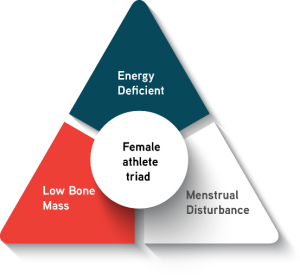Eating Advice For Active Women

The Female Athlete Triad
The female athlete triad is an interrelationship of menstrual dysfunction, low energy availability (with or without an eating disorder), and decreased bone mineral density.
Particularly common in young female athletes, amenorrhea, or the absence of menstruation for 3 months or longer, can lead to decreased bone health as bones lose calcium due to lower estrogen levels. Over time, this can lead to increased risk of fractures/breaks, bone mass loss, osteopenia and osteoporosis. A loss of menstruation often occurs when there is low energy availability. The body is using all its energy for metabolic processes and for training/exercise/competition, so may not have enough energy left to cover other daily demands such as menstruation. Low energy availability doesn’t just affect those with low body fat percentages or with diagnosed eating disorders, it can exist in those with adequate body fat levels! This can occur from an imbalance of training demands and food intake, especially when there are time constraints and other commitments involved.
Signs and symptoms of the Female Athlete Triad
- • Delayed menarche in young females (absence of first menstruation by age 16 years)
- • Amenorrhea (absence of menstruation for more than 3 months)
- • Weakened immune system – you may find yourself getting sick more often
- • Reduced performance and recovery
- • Poor bone health (determined by bone mineral density below normal)
- • Low moods or irritability
- • Restriction of food intake or certain food groups, or skipping meals regularly to achieve weight loss
If any of these signs or symptoms sound familiar to you, our sports dietitian can provide guidance on managing your health while fuelling exercise demands. Contact reception on +61 2 9280 2322 or head to our online bookings page to book in a chat with Kelsey.
Now that you know what the female athlete triad is, the next blog post will focus on hormone changes across the menstruation cycle and how this can impact performance. Luckily, there are dietary strategies that can be used to optimise performance at different times of the month. Stay tuned!


